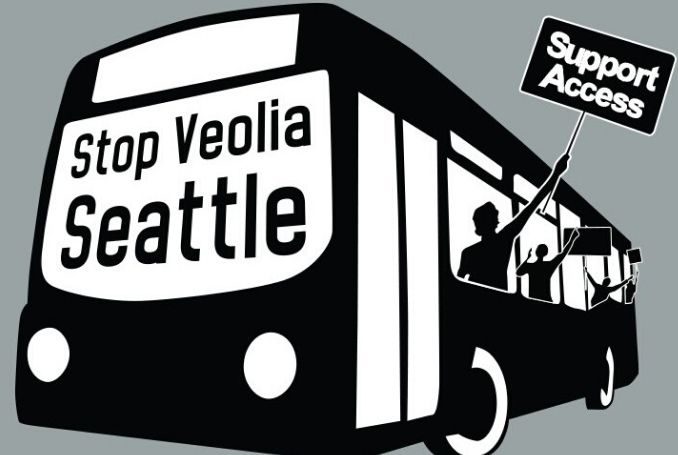
A 7-year campaign led by disabled riders and anti-imperial, anti-privatization, disability justice, and labor solidarity activists has pushed King County in Washington State to cut ties with a corporation that was subcontracting Metro’s Access transit service. Veolia operated the federally mandated paratransit service.
Veolia has long been a target of the movement to boycott, divest and sanction Israel until it complies with international law and ends its human rights violations of Palestinians. Veolia built the Jerusalem Light Rail connecting illegal Israeli colonies in internationally recognized Palestinian territory to Jerusalem and operated “Israeli-only” apartheid bus lines across the West Bank.
Veolia managed a landfill on Palestinian land in the Jordan Valley that dumped waste from the settlements and from Israel in violation of the 4th Geneva Convention; and provided wastewater services to illegal colonies.
Veolia has also long been a target of water justice activists. It is implicated in the lead poisoning crisis in Flint and mass water shutoffs in Detroit. In the poorest province of Argentina, a Veolia subsidiary tripled the cost of water while not fulfilling its contractual obligations to expand the water network, in fact, turning the water brown. A World Bank court sided with the water privatizing Goliath arguing that they have a right to make a profit, even though they didn’t fulfill their contractual obligations.
Veolia was founded by the imperial decree of Napoleon III. Some of its first contracts were providing water and transportation to the French colonies. Today Veolia is the largest privatizer of water and transportation, marking a clear trajectory from slavery and colonization to the privatization of public services.
In August 2015, in response to BDS activists costing Veolia reportedly over $24 billion in lost contracts, Veolia announced it was selling all of its enterprises in Israel/Palestine, marking a major victory for BDS. That same month Stop Veolia Seattle was set to release our epic 101-page Zine, layout was final when we learned of the amazing BDS victory. We updated the Zine and went to print a week later.
In the process of getting Veolia out of King County in solidarity with Palestine, Flint and all who have been targeted by Veolia around the world, Stop Veolia Seattle organizers stood side-by-side with riders and drivers, winning improved standards for riders and increased protections for drivers.
At the beginning of this campaign, Veolia drivers did not have a union. In November 2015, a week after the historic victory of the Boston school bus drivers against Veolia, Teamsters 117 were able to leverage the Stop Veolia Seattle campaign to win a union contract for Veolia/Transdev drivers. MV, the new contractor for Access, is now honoring this same union contract.
This is the power of multi-issue organizing and building truly intersectional movements.
Riders, drivers and corporate accountability activists have been organizing for this victory since around the time that the contract was awarded to Veolia in 2008. ATU Local 587 protested the cancellation of their union-represented contract during the height of the financial crisis. Metro promised King County $1 million worth of savings, but within 3 years of signing the new contract, taxpayers were paying $7.7 million more annually to Veolia while total rides and total service hours were down — and none of this taxpayer investment went to the workers.
Riders were reporting worsened service since Veolia took over. Now deceased Transit Riders Union member and Access rider Lonnie Nelson noticed a difference in service and quality between drivers who were part of the union and those who didn’t have a union. In 2012 Stop Veolia activists began meeting in solidarity with riders and drivers and in solidarity with the Palestinian struggle for self-determination and all of those impacted globally by Veolia’s practice of undermining public access to safe drinking water, public transportation, and their hostile labor practices.
After a long pressure campaign, a 2017 King County Auditors report revealed what riders had long suspected: the contractors, including Veolia/Transdev, got paid more the longer that riders were on the Access van, with no standards for on-board time defined, monitored or enforced. So there was a clear financial incentive to the subcontracting companies for riders being driven circuitously past their homes and across the county before eventually being dropped off, as many riders had been reporting.
Metro was able to bid out and sign a contract that did not hold contractors to the Americans with Disabilities Act (ADA), failing to require contractors to monitor trip length and allowing the contractor to drop riders off excessively early.
Metro testified before Council urging Council not to fund higher levels of service, explaining that private companies bidding for service factor penalties into their bid. So that King County taxpayers would end up paying these penalties and would ultimately pay more for the same lower level of service. Bingo. This is why we should not be contracting our public services to for-profit corporations.
There is now a new private company operating Access in King County. The standards in the new contract are way better than the standards in the first RFP that Metro released. And they are way below the standards that Access riders in Metro’s RFP Working Group insisted upon. We need to keep up the work together to hold Metro accountable and to bring Access in-house to be operated by Metro directly.
Opportunities for Joint Resistance
The Stop Veolia Seattle Zine connecting struggles against Veolia around the world includes a feature-length piece on Veolia/Transdev’s privatization of buses in Chile, their illegal anti-labor practices and poor service that led to multiple spontaneous protests in the years before the Zine was published. Today millions of people in Chile are in the streets refusing neoliberalism. The example of Chile shows us what privatization does to our public services, how it feeds inequality and why it is important that we reclaim our public infrastructure.
It is not surprising that the same corporations who are pillaging investments in public infrastructure are also partnering with the Zionist regime to profiteer off of Israeli apartheid and settler colonialism.
This campaign raises similar questions as to those that have arisen following the defeat of Bechtel in Cochabamba, Bolivia, and fights against the privatization of water in Latin America, raised by water justice activist Marcela Olivera in her submission to the Stop Veolia Seattle Zine: How do we do oversight? What do public-public partnerships or public-community partnerships actually look like?
Marcela is one of the lead signatories of the Marseille Declaration released at the 2012 Alternative World Water Forum. The declaration read in part:
“We commit to take action in solidarity with Palestinian human rights, including the human right to water”.
“We launch this declaration calling upon global citizens of conscience to take action for Palestinian water rights as members of the global water rights movement are organizing to resist the corporatization of our common water heritage. We launch this declaration here in Marseille, France, home to the World Water Council, the corporate think tank and lobby group founded by multinational corporations and the World Bank.
“As the World Water Council convenes the 6th World Water Forum promoting the privatization of water and sanitation services, we call out the corporate members of this Council for profiting from the privatization of water and sanitation services globally – and in particular, we call out the transnational French corporation Veolia for also providing sanitation services to the illegal Israeli settlement of Modin Illit which is colonizing Palestinian land, for illegally dumping garbage from Israel in the occupied Jordan Valley, and for profiting from apartheid transportation services that serve illegal colonies while denying Palestinians service.
“Our struggles are intricately linked. As we resist corporate and state profiteering from human rights violations in Palestine, we are resisting discrimination in access to water and promoting global water justice.”
Across the UK and Europe, municipalities have passed resolutions preventing Veolia from bidding on public contracts due to its profiteering from Israeli apartheid. in 2013 a small group of Palestine solidarity activists in St Louis, MO were able to stop Veolia from getting a local water contract.
Veolia shows us that the struggle to protect local public services is a struggle against colonization and imperialism. Uplifting the struggles of marginalized communities wherever we are is also a stand for Palestinian self-determination and one approach to chip away at the imperialist infrastructure that is oppressing Palestinians and people everywhere.
– Susan Koppelman is a local organizer with Stop Veolia Seattle, Seattle Transit Riders Union and WA ADAPT, among other projects. They lived in Palestine from 2006-2012 supporting the Palestinian grassroots water justice collective LifeSource.







